October 5, 2022
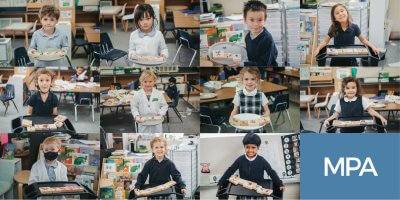 MPA’s Makerspace intentionally provides students with opportunities to construct meaning through making with practical, hands-on, interdisciplinary, problem-based projects. In this space, students of all ages use design thinking to develop empathy with individuals and design creative solutions to problems through an iterative process involving brainstorming, prototyping, and testing. The Makerspace allows for the blend of technical and creative skills conducive to developing a well-rounded individual.
MPA’s Makerspace intentionally provides students with opportunities to construct meaning through making with practical, hands-on, interdisciplinary, problem-based projects. In this space, students of all ages use design thinking to develop empathy with individuals and design creative solutions to problems through an iterative process involving brainstorming, prototyping, and testing. The Makerspace allows for the blend of technical and creative skills conducive to developing a well-rounded individual.
Kindergarteners are experiencing the immersive magic that occurs daily in our Makerspace. For one of their first projects of the year, the eager students gathered around Mr. Braafladt, the Makerspace technology and innovation teacher. They watched in wonder as he carefully demonstrated their tasks and introduced the letter block activity.
The first letters that children learn are most often the ones in their names. In early kindergarten, names are used to practice letter recognition, syllables, counting, and so much more. In this project, Ms. Santiago’s class leveraged the Makerspace to take this foundational literacy work to a more creative and hands-on level.
For this experiential learning activity, kindergarteners were given small blocks of wood with the letters of their names outlined on them. Their challenge was to glue different materials over these outlined letters, producing unique and personalized art pieces.
Ms. Santiago explains, “Even though this project gave each student a beautiful end product, it is a prime example of a process-driven Makerspace experience for the students. Mr. Braafladt and I offered a wide variety of materials and intentionally left the rest up to the kids. They had to decide which material to use, how to best attach the material to their letters, and how to troubleshoot the problems that came up as they worked. Process-driven learning fosters creativity, independence, and perseverance.”
According to a Philly Art Center article on the importance of process-driven art for children, “If we show them an example and proceed to teach them exactly how to make their project the same as ours, we have only given students one answer to one question and both came from us. But if we instead give them materials and demonstrate the many ways they can use that material, we are posing questions and teaching them to find their own solutions in a world of possibility.” The Makerspace letter block project is an instrumental activity in developing autonomy for young MPA learners!
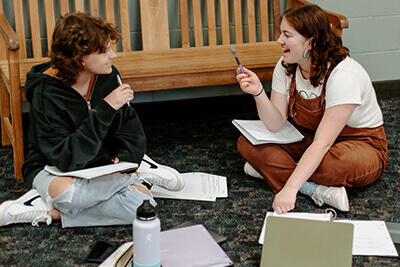 from Dr. Jules Nolan, MPA school psychologist
from Dr. Jules Nolan, MPA school psychologist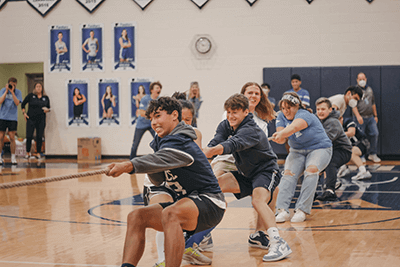 Homecoming 2022: We Are Panthers was a huge success!
Homecoming 2022: We Are Panthers was a huge success!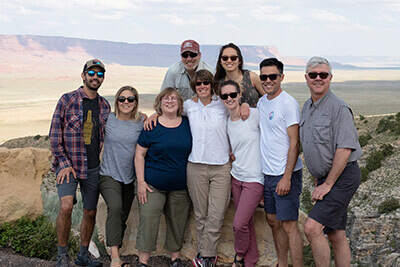 Nastya Vershenya ’01 and Sarah Hanson Salgado ’03 are each other’s chosen family. Their story begins in Sarah’s seventh grade year at MPA, when, as an only child, MPA’s call for families to host an international student was appealing and exciting. Both Sarah’s family and Nastya, coming as an international student to MPA from Minsk, were looking for the same thing, but none of them expected to gain a bonus sister/daughter in the process.
Nastya Vershenya ’01 and Sarah Hanson Salgado ’03 are each other’s chosen family. Their story begins in Sarah’s seventh grade year at MPA, when, as an only child, MPA’s call for families to host an international student was appealing and exciting. Both Sarah’s family and Nastya, coming as an international student to MPA from Minsk, were looking for the same thing, but none of them expected to gain a bonus sister/daughter in the process.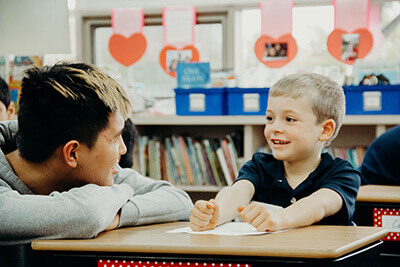 Parent of alumni and fourth grade teacher DeeDee Stacy shares her experience hosting Lyndon Lyu ’20.
Parent of alumni and fourth grade teacher DeeDee Stacy shares her experience hosting Lyndon Lyu ’20. Since its founding, MPA has pioneered whole child education in the Twin Cities with a commitment to helping students deepen their understanding of themselves and the world around them. We persistently innovate in alignment with that core value, providing experiences that are challenging to replicate anywhere else.
Since its founding, MPA has pioneered whole child education in the Twin Cities with a commitment to helping students deepen their understanding of themselves and the world around them. We persistently innovate in alignment with that core value, providing experiences that are challenging to replicate anywhere else. Class of 2018 alum Pranay Somayajula, now at The George Washington University, shares that he chose to pursue the Global Certificate and “the most valuable part of the program was the way it motivated me to get out of my comfort zone and explore the full range of cultural and foreign-policy opportunities the Twin Cities has to offer.” Maija Olson ’17 reflects on her Global Certificate as well, saying, “The freedom to guide my learning offered a new kind of independence. I enjoyed the ability to deeply explore various world issues and focus on something I was truly passionate about.”
Class of 2018 alum Pranay Somayajula, now at The George Washington University, shares that he chose to pursue the Global Certificate and “the most valuable part of the program was the way it motivated me to get out of my comfort zone and explore the full range of cultural and foreign-policy opportunities the Twin Cities has to offer.” Maija Olson ’17 reflects on her Global Certificate as well, saying, “The freedom to guide my learning offered a new kind of independence. I enjoyed the ability to deeply explore various world issues and focus on something I was truly passionate about.”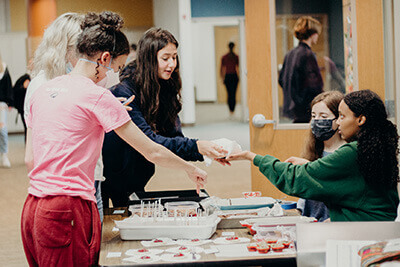 At home, you teach your children values. Shouldn’t their school do the same? Respect and integrity are integral components of the Mounds Park Academy mission, and character development is woven into the MPA experience. Rooted in the idea that the human character is malleable and children are exceptionally capable of positively impacting the world, character has been taught as one part of the whole child at Mounds Park Academy since 1982.
At home, you teach your children values. Shouldn’t their school do the same? Respect and integrity are integral components of the Mounds Park Academy mission, and character development is woven into the MPA experience. Rooted in the idea that the human character is malleable and children are exceptionally capable of positively impacting the world, character has been taught as one part of the whole child at Mounds Park Academy since 1982.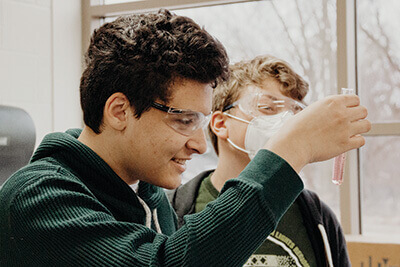 As a top ranked college prep school, MPA has the responsibility to prepare students for college, and more importantly, for life. At every grade level, MPA finds a developmentally appropriate way to incorporate rigor–not just for the sake of a rigorous education, but to challenge students to push their limits, discover what they are truly capable of.
As a top ranked college prep school, MPA has the responsibility to prepare students for college, and more importantly, for life. At every grade level, MPA finds a developmentally appropriate way to incorporate rigor–not just for the sake of a rigorous education, but to challenge students to push their limits, discover what they are truly capable of.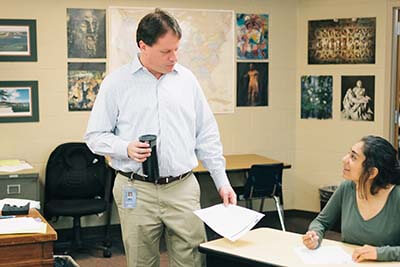 What is it about great teachers that makes them stand out?
What is it about great teachers that makes them stand out?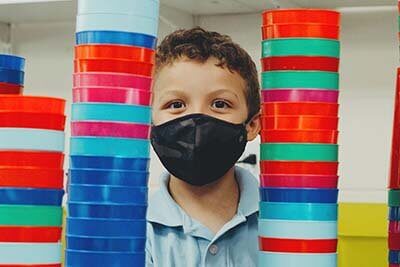 To say the least, parenting young children has presented many new challenges throughout the last two years. The COVID-19 pandemic has resulted in fewer opportunities for children to interact with their peers and develop independence. As students ages three to five prepare to attend PreK or kindergarten at MPA, many parents have questions and concerns about their child’s social and emotional readiness during this challenging time.
To say the least, parenting young children has presented many new challenges throughout the last two years. The COVID-19 pandemic has resulted in fewer opportunities for children to interact with their peers and develop independence. As students ages three to five prepare to attend PreK or kindergarten at MPA, many parents have questions and concerns about their child’s social and emotional readiness during this challenging time.